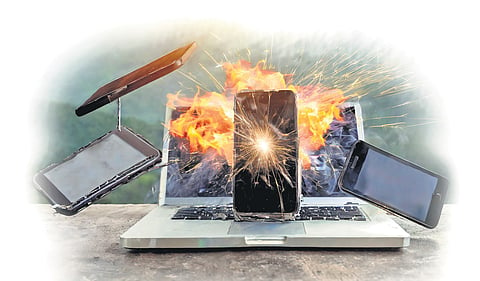

NEW DELHI: In a first-of-its-kind incident, hundreds of pagers used by Lebanon-based militant group Hezbollah exploded on September 18. The explosions caused serious damage, claiming more than 10 lives and injuring more than 3,000 people, raising several questions about gadget safety. Following the attack, concerns were raised about whether similar incidents could occur with other devices, such as smartphones, laptops, or any other gadget, given that lithium-ion batteries are also part of these devices. Now, the big question is: are your gadgets safe?
What is a pager, and why did Hezbollah use it?
According to reports, Hezbollah used pagers for security concerns. A pager, also known as a beeper, is a simple communication device that receives short messages via radio frequencies. Popular before the widespread use of mobile phones, pagers were used for one-way communication, typically for alerts, notifications, or short messages. Hezbollah used the outdated device to evade Israeli intelligence surveillance. Simply put, pagers operate with simple technology, making it difficult to track users. Some reports suggest that Israeli agents inserted explosives into the pagers ordered from a Taiwanese manufacturer, although the company denied the claims. If true, this indicates the explosion was triggered remotely using advanced means.
How vulnerable is your smartphone?
A few believe that pagers were tampered with before being delivered to Hezbollah members, because the devices did not show malfunctions such as overheating. Reports say a tiny explosive measuring as little as 1 ounce was implanted next to the battery of each pager. A switch was also embedded that could be triggered remotely to detonate the explosives in the beepers. This poses the question: what are the risks of relying on lithium-ion batteries used in both pagers and smartphones? Does it mean that other devices are also vulnerable? Technically it is possible but chances for mobile devices to be sabotaged are minimal.
Why lithium-ion batteries?
Electronic manufacturers use lithium-ion batteries in their devices due to their high energy density and rechargeability. However, at times, excessive heat, overcharging, or physical damage can cause these batteries to overheat; however, exploding is rare. Barring a few incidents—for instance, Samsung’s 2016 Galaxy Note 7 recall due to “battery cell issues” that caused devices to catch fire or explode—in most cases, incidents are rare, affecting only dozens, not thousands.
According to experts, complex software and network connections in smartphones might present more opportunities for remote manipulation, especially if vulnerability in the device’s firmware could be exploited. However, executing such an attack is more challenging.
Experts point out that phones don’t explode even if hackers manipulate them to increase battery heat by modifying the current flowing into them. There may be some stray incidents of explosion, but not en masse.Moreover, technically, smartphone manufacturers use various technologies, such as cooling chambers, vapor chambers, and graphite cooling systems, to dissipate heat from devices. Many smartphones use vapor chambers and graphite cooling systems that spread heat evenly across the device, using liquid that evaporates and condenses to dissipate heat, while graphite layers help conduct heat away from critical components like processors.
That said, even in scenarios where smartphones are manipulated to overheat, chances are that, instead of exploding, phones will melt, causing battery swelling or leakage.
When can batteries catch fire?
In cases of excessive heat, overcharging, or exposure to high temperatures, overheating can lead to explosions. Also, manufacturing defects, such as faulty components or design flaws, can increase the risk of battery failure. Sometimes, external damage to batteries or phones can compromise their safety, leading to hazards. Therefore, to minimise the risk of battery-related incidents, users should use official chargers instead of third-party options, keep devices away from extreme heat or cold, monitor battery health and watch for signs of degradation or unusual behaviour, and replace old or faulty batteries with genuine replacements.